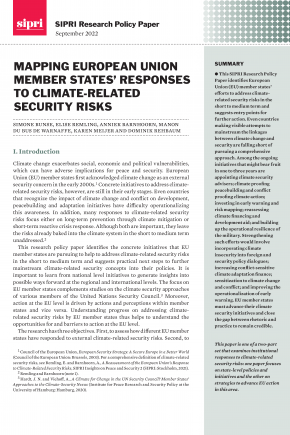Mapping European Union Member States’ Responses to Climate-related Security Risks

This SIPRI Research Policy Paper identifies European Union (EU) member states’ efforts to address climate-related security risks in the short to medium term and suggests entry points for further action. Even countries making visible attempts to mainstream the linkages between climate change and security are falling short of pursuing a comprehensive approach. Among the ongoing initiatives that might bear fruit in one to three years are appointing climate security advisers; climate proofing peacebuilding and conflict proofing climate action; investing in early warning and risk mapping; reassessing climate financing and development aid; and building up the operational resilience of the military. Strengthening such efforts would involve incorporating climate insecurity into foreign and security policy dialogues; increasing conflict-sensitive climate adaptation finance; sensitization to climate change and conflict; and improving the operationalization of early warning. EU member states must advance their climate security initiatives and close the gap between rhetoric and practice to remain credible.
This paper is part of a two-paper set that examines institutional responses to climate-related security risks with one paper focusing on state-level policies and initiatives and the other on strategies to advance EU action in this area. On strategies to advance EU-level action on climate-related security risks, the other paper in this set, see Bunse, S. et al., Advancing European Union Action to Address Climate-related Security Risks, SIPRI Research Policy Paper (SIPRI: Stockholm, 2022).
A separate annex contains the draft case studies that were written up as background research for these two papers. This annex has been provided to give additional information and practical examples from different country contexts; it includes Belgium, France, Germany and Ireland. However, as unedited research material, this annex is not considered part of the formal SIPRI publication.
I. Introduction
II. Member states’ security concepts and drivers of action: Similarities and differences
III. National policies and initiatives on mainstreaming climate security
IV. Opportunities to enhance national initiatives to address climate-related security risks
V. Critical juncture and avoiding politicization of climate security
Appendix A. Analytical framework and methodological considerations
Appendix B. Similarities and differences between selected European Union member states across various dimensions





